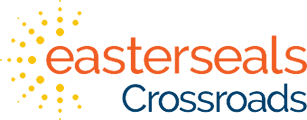iCan Bike is a highly successful program that provides instruction for people with disabilities so that they can learn how to ride a two-wheel bicycle. The program is offered through iCan Shine – a nonprofit organization that collaborates with local organizations around the country to host training opportunities for bike riding and other activities.
Local organizations like Easterseals Crossroads agree to promote the program, engage a venue, find the participants, provide staff to coordinate and run the program and then recruit volunteers to create an environment where each bike rider is empowered to maximize his/her individual abilities.
The iCan Bike program consists of a highly refined and researched protocol and very special equipment. The protocol involves providing initial success and confidence (by way of special equipment – the roller bike). Once a rider is comfortable on a stable roller, there is a very gradual and subtle increase in difficulty by adjusting the size and shape of the roller, which increases the challenge to the rider’s balance teaching them to correct ever larger imbalances. Eventually a transition to a two-wheeled bike is completed when the rider has attained the appropriate level of success.
Staff Highlight – Meet John Kelly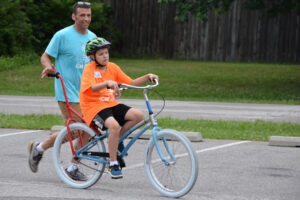
Easterseals Crossroads has been offering this program for well over ten years. Staff member John Kelly has been involved for nine of those years as the director of the program. His unique background has made him especially suited to the needs of the program; not only does he head the home modification program at Easterseals Crossroads, he is a licensed physical therapy assistant. As a cycling enthusiast his entire life, he sees the benefits of cycling as a form of exercise, transportation, freedom and inclusion.
Frequently parents are skeptical or unsure about the prospect of learning how to ride a bike in a single week. Often they have tried to teach their own child to ride for years, which has resulted in frustration and fear of failure. iCan Bike has a proven success rate of approximately 80% of riders who can ride independently by the end of the camp week.
There are so many factors that go into success rates and often success comes in many forms; some riders might be afraid to put a helmet on or go near a bike. Success for that person might include pedaling in a straight line with assistance. Success then continues the next year when that same camper potentially returns and learns to ride independently. Every year, the camp hosts a few return riders who ultimately become independent on a bike.
“This camp works! The program is a lot of hard work and some magic that comes from the combination of many factors coming together to create success – most importantly, the iCan Bike program and huge amounts of dedicated (and physically fit) volunteers,” said John.
The ability to ride a bike for recreation and transportation can provide inclusion with friends, family and community that can in turn improve physical fitness, mental health and overall quality of life. In addition to the ability to ride a bike, the increase in self-esteem and confidence are often dramatic affecting other positive changes in family dynamics, school and friendships. Instead of being left behind, the child with a disability is empowered to be able to participate in a fun outdoor activity with friends and neighbors.
Success of iCan Bike depends largely on the 80+ volunteers needed to offer the program each year. Volunteers must be able to run alongside their riders offering support and encouragement. The program has established relationships with many sports teams from schools located on the south side of Indianapolis near the venue, Perry Park. Coaches have encouraged players to volunteer at iCan Bike since it is a demanding workout as well as a team building activity – all for a great cause.
Staff Highlight – Meet Shae Kelly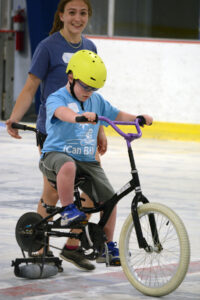
John believes that volunteers get as much out of the program as the volunteers do because the bond than naturally forms between a volunteer and rider is so genuine. He has turned the camp into a family affair and has recruited his own three kids Shae, Piper and Brody as volunteers. There is a lot that goes into a week of camp including hard work and learning as well as emotional experiences with success and challenge. John believes these qualities are important for kids – including his own – to learn in order to become adults who are valuable to society, to employers and in interpersonal relationships.
John and his daughter Shae ran the program again this year; they are hands-on camp directors. Neither one can just observe and/or watch the sessions; they truly enjoy participating in the program. Both enjoy physical exercise and being outside. Most importantly, they both understand that demonstrating a high level of active commitment to the volunteers helps to improve engagement and participation. When they can demonstrate necessary skills directly to the volunteers, it guides the high level of enthusiasm needed for the positive outcomes in the program. They are a team; every volunteer is engaged to be part of that team.
“I began as a full-time volunteer in 2016; my sister and I were recruited as soon as we were old enough. Instead of signing up for a specific session, our dad had us attend every session each day and we were paired with riders whenever a session needed extra volunteers. I don’t think my sister or I knew how important this camp would become to our family in the coming years. It has been so fun to work with my dad, brother and sister – we even recruited my mom this year for a few sessions and I got to run alongside a rider with her,” said Shae.
Shae is a junior at Villanova University double majoring in computer science, peace and justice with an ethics minor. The iCan Bike program has guided her interest in social justice and she feels more vocal about disability awareness because of experiences with iCan Bike. “I have seen first-hand the struggles that kids with disabilities overcome in learning to ride. My favorite part of camp is watching the excitement from both riders and parents in accomplishing the goal of riding. There are always happy tears from the parents; I cry as well almost every year,” said Shae.
Volunteer Highlight – Meet Michael Ferron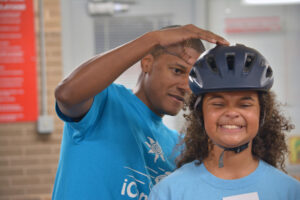
Michael has volunteered at iCan Bike for the past two years. His initial motivation was to support a fun and educational program. Beyond that, Michael is an agency board member who feels that his commitment to the agency extends beyond governance. Understanding what staff members do is critical to him understanding the importance of the programs upon which our community depends.
“Biking, running and playing outside were huge parts of my childhood and teenage years. Bike riding was mostly a way to get around the neighborhood and spend time with friends. As an adult, biking has primarily been for fitness and to get outdoors more often. After my first day as a volunteer for iCan Bike, I spoke with my mother who told me that I learned to ride a bike at five years of age. I realized bike riding was so prosaic that I could not remember when I could not do it. I now see how privilege and ableism influence our views about seemingly ordinary skills like using a bicycle,” said Michael.
Since the same volunteer works with the same rider each day of the five-day camp, volunteers can observe progress. Michael was so happy and sometimes surprised to watch the riders make so much significant progress with the help and assistance of their volunteers who are often high school students.
“I was very impressed with the young volunteers working with our program participants. I have been involved with people with disabilities in my community since I was 18. This has definitely shaped my passion for advocacy and inclusion for almost 20 years. Hopefully, experiences like iCan Bike will do the same for teens who volunteer with this program each year. Even though I felt physically exhausted after some sessions of iCan Bike because of all the running, I felt great emotionally because of the riders,” said Michael.
“One of my riders left a very strong impression on me. At the end of this rider’s second or third session, her mother was in tears after witnessing how quickly her daughter had progressed. She said that a few years ago, she accepted the fact that her daughter woul
d never ride a bike. But after this training, she truly believes that her daughter can do it. She then went on to say that she would be fine if her daughter had to live with her the rest of her life, but if she could learn to go out into the world and live independently, that would change both of their lives. Admittedly, I choked up hearing that and hugged my own daughter that night thinking about how much I take for granted. Services at Easterseals Crossroads are so vital to the families we serve,” said Michael.
Volunteer Highlight – Meet Sarah Schwomeyer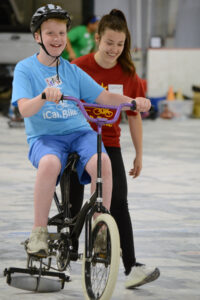
Sarah was a first-time volunteer at iCan Bike this year. Sarah is also a board member at Easterseals Crossroads and wanted to become involved because she is so dedicated to the mission of learning to ride a bike. She knows that bike riding is a very direct way to help a young person gain confidence and wanted participants to have that opportunity. Since iCan Bike depends so heavily upon volunteers to make it happen, Sarah was concerned that some people wouldn’t be able to participate in the program until more volunteers stepped up.
The model of iCan Bike benefits from the relationships that form with riders and their volunteers. Sarah enjoyed getting to know her rider buddies during their breaks. She found that when she and her rider could relax for just a short time during a break, the bond between them would strengthen. Riders benefit in knowing that their volunteers truly do want them to succeed and have fun during the process of learning to ride.
“The parents of one of my riders proudly told me that his son’s confidence and skills were way ahead of where they had been a year ago. I felt proud after every volunteer session because it was so very rewarding to see how much my riders improved in just the short time we were together each day. I literally saw them gain confidence in themselves right before my eyes! I was so surprised to see participants improve two or three levels – from the training bike to the two-wheel bike to riding independently outside – in just one or two sessions. The program is amazing. And I must also say that I was proud of myself for getting some good cardio,” said Sarah.
iCan Bike offers a bridge leading to confidence and independence for its participants. The confidence that results from something as important as that first bike ride can be life changing. It takes a community to guide the outcome of this program, one that Easterseals Crossroads is proud to offer because the power of independence can create a more inclusive community for our future.
